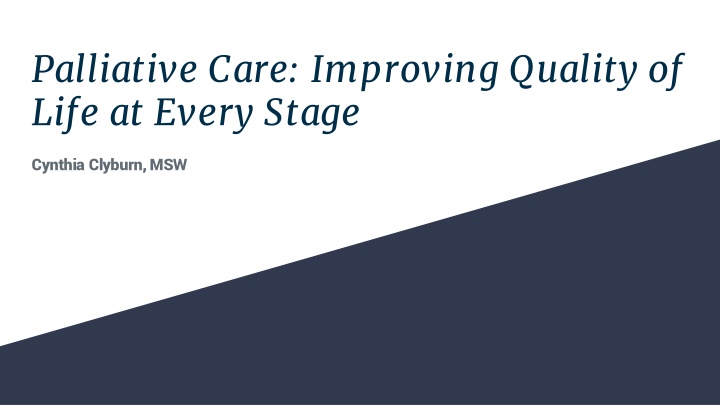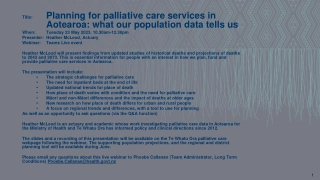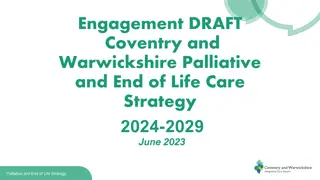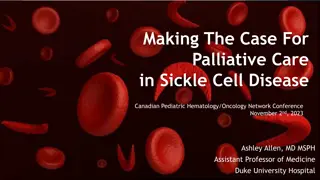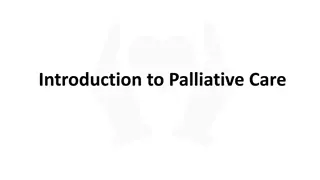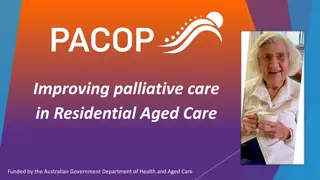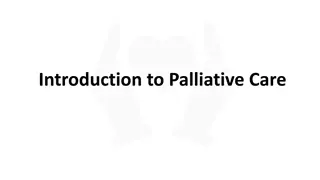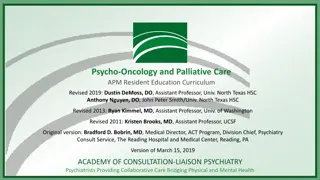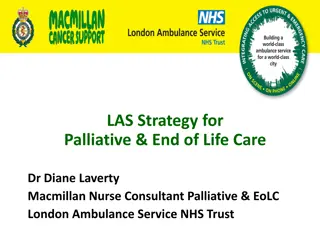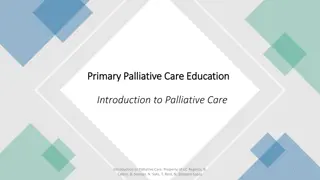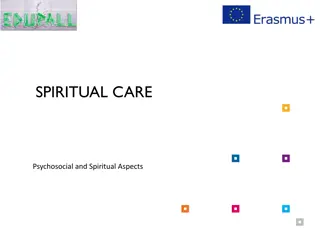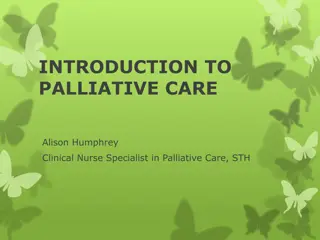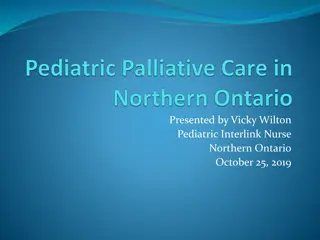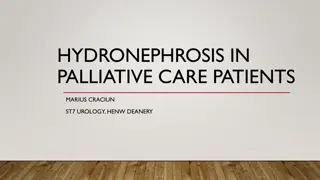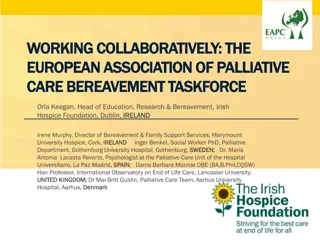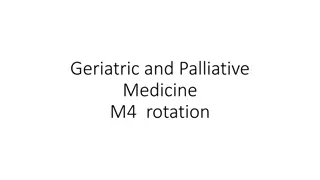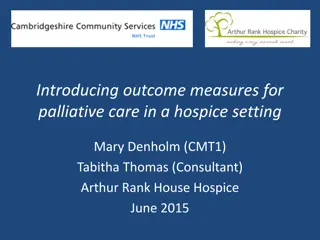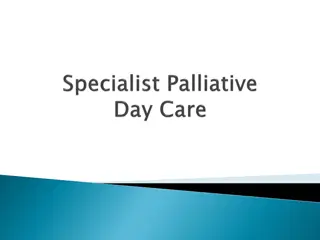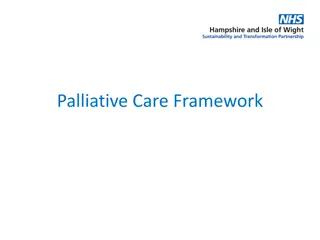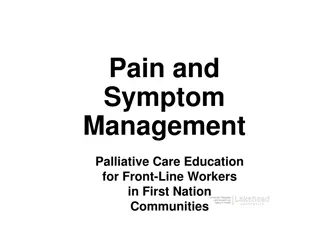Palliative Care: Improving Quality of Life
Palliative Care focuses on providing person and family-centered medical care for individuals with serious illnesses, aiming to improve their quality of life. It involves a team of healthcare professionals working together to meet medical and psychosocial needs, and can be implemented at any stage of the disease. Key concepts include defining palliative care, pediatric care, school support, IDEA support for caregivers, higher education transition, independence establishment, vocational support, and advance care planning.
Download Presentation

Please find below an Image/Link to download the presentation.
The content on the website is provided AS IS for your information and personal use only. It may not be sold, licensed, or shared on other websites without obtaining consent from the author.If you encounter any issues during the download, it is possible that the publisher has removed the file from their server.
You are allowed to download the files provided on this website for personal or commercial use, subject to the condition that they are used lawfully. All files are the property of their respective owners.
The content on the website is provided AS IS for your information and personal use only. It may not be sold, licensed, or shared on other websites without obtaining consent from the author.
E N D
Presentation Transcript
Palliative Care: Improving Quality of Life at Every Stage Cynthia Clyburn, MSW
Key Concepts Defining Palliative Care Pediatric Care School Support/ IDEA Support for Caregivers Higher Education Transitioning from Pediatric to Adult Care Establishing Independence Vocational Support Advance Care Planning
What is Palliative Care? Person and Family-Centered medical care for individuals living with serious illness A team of doctors, nurses, therapists, social workers, and other professionals working together to meet medical and psychosocial need Goal is to improve quality of life Can be implemented at any stage of the disease getpalliativecare.org
Childhood Psychological and Emotional Support- Medical Care- Access to diagnostic information, appropriate medical team, treatment Access to supportive counseling, play therapy, speech therapy, occupational therapy, respite care, and more
Childhood IDEA- The Individuals with Disabilities Education Act (IDEA) is a law that makes available a free appropriate public education to eligible children with disabilities throughout the nation and ensures special education and related services to those children. Part C- Infant and Toddler Services (Birth-age 2) Part B- Ages 3-21. Early Childhood Special Education and School Age. (IEP)
IDEA- Who Qualifies? - Autism - Deafness - Blindness - Emotional Disturbance - Intellectual Disability - Multiple Disabilities - Orthopedic Impairment - Other Health Impairment - Learning Disability - Speech/Language Impairment - Traumatic Brain Injury
-Civil Rights Legislation Section 504 - Federal law under Rehabilitation Act -Provides accommodations, not special education - Preferential Seating - Note taker - Accessible Transportation - Extra time to complete tests - Rest periods - Someone to push wheelchair - Quiet space to take tests
Teenage/Young Adulthood Higher Education and Section 504 - Colleges and Universities that receive federal education funding are required to accommodate students living with disabilities. - Provide student aids - Accessible buildings - Extra time to complete tests - Accessible transportation - Allowing service animals - Allowing financial aid, even for part-time students National Parent Center on Transition and Employment www.pacer.org
Transitioning Care - Meeting with medical teams - Begin discussion early (14, 15 years old) - Collaborate with interdisciplinary teams - Gain an understanding of the supports/services/specialities offered - Provide medical records, genetic testing, equipment, insurance information, etc. - Addressing Holistic needs of person/family - Address housing, education, employment, relationships, mood, etc. - Establishing independence - Empower youth to take charge of their own medical care
Adulthood Vocational Rehabilitation- Offices designed to help individuals living with physical or mental disabilities obtain or retain employment. - Offers case management - Individualized plans - Advocacy for reasonable accomodations - Assistive technology - Training, counseling, placement assistance - Assistance with tuition, driving accommodations, transportation, etc. www.dli.pa.gov
-Social Security Income- Pays monthly income to those 65+ and individuals living with disabilities Navigating Insurance, Social Security Income - Under 18- based on parents assets - Diagnosed before 22- can receive social security disability - Can receive SSDI based on earnings -PASS- Plan for Achieving Self Support www.ssa.gov/disability -ABLE Account - Vocational Rehab and SSI
- Every state offers a medicaid-funded waiver program Medicaid Waivers - Designed to keep skilled nursing eligible individuals with disabilities in their own communities - Home Care Aids - Home Modifications - Case Management - Meal deliveries - Assistive devices - Access to more services and therapies www.medicaidwaiver.org
Emergency Care Planning Advance Care Planning - Listing your providers (neurology, pulmonary, cardiologist) - Note cards to explain anesthesia requirements Advance Directives - Power of Attorney -Five Wishes www.fivewishes.org
Resources https://www.mda.org/young-adults https://www.mda.org/young-adults/resources http://quest.mda.org/news/thinking-college-think-scholarships http://www.myotonic.org/sites/default/files/Financial%20Resources%20fo r%20Families%20with%20DMPDF_1.pdf https://www.scholarships.com/financial-aid/collegescholarships/scholarships-by-type/disability- scholarships/ https://www.chop.edu/centers-programs/transition-adulthood-program/health-resources
